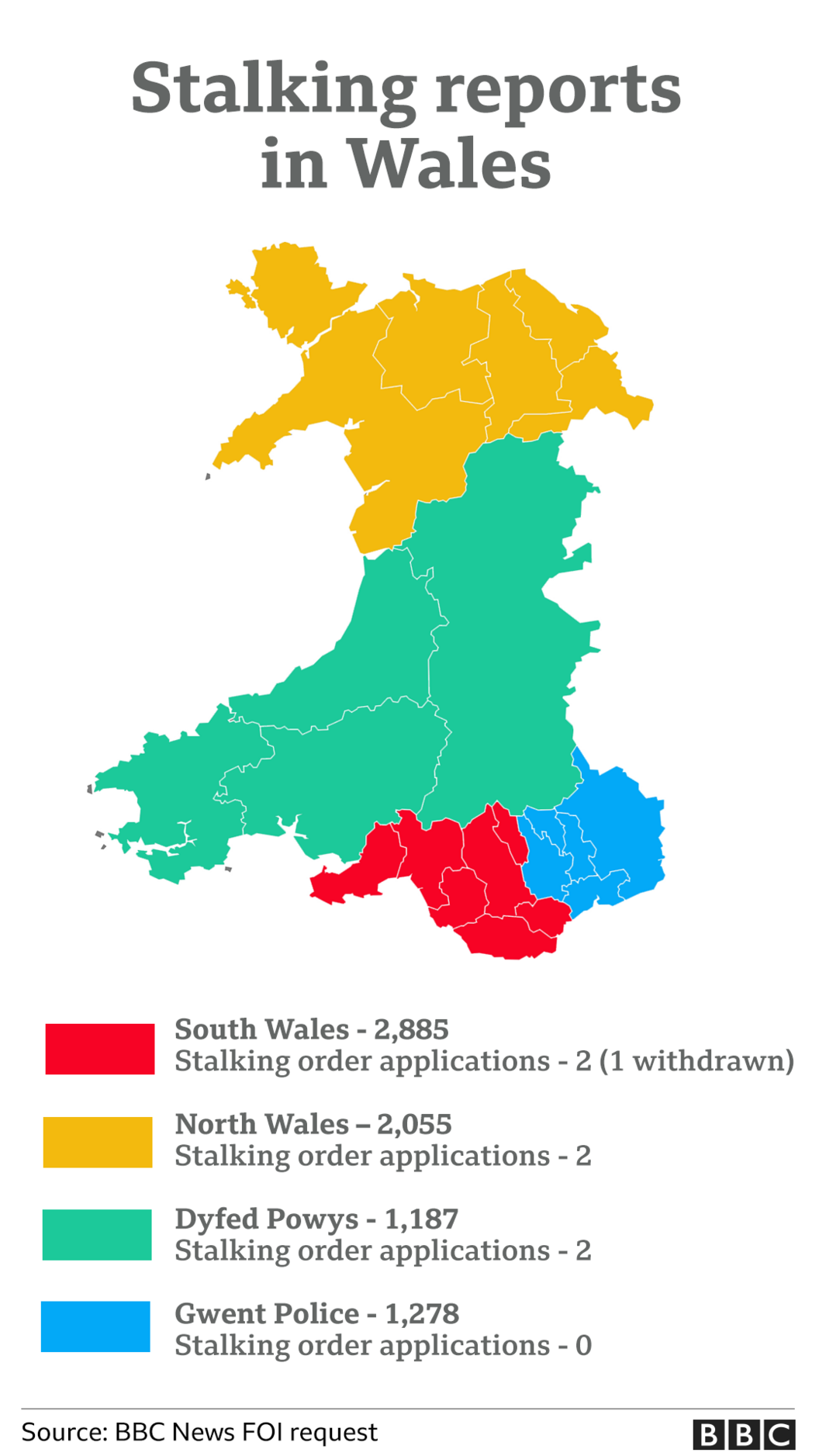Stalking: Five orders issued compared to 7,000 complaints
- Published
A woman who was stalked is calling for police to use their powers more effectively.
Only five stalking protection orders were issued in Wales last year despite more than 7,000 reported offences.
The number of reports more than doubled from 2020 to 2021 and campaigners want better education so police officers can recognise when an order is needed.
Stalking victim Sara Manchipp said she was "concerned about the message it's sending out".
All Welsh police forces said stalking was a serious offence and the orders were one method used to address it.
Stalking Protection Orders, external were brought in two years ago, but a Freedom of Information request (FoI) by BBC Wales Live found that one Welsh force did not apply for any last year.
Sara, from Port Talbot, was stalked for eight months. The perpetrator was caught and jailed.

Sara Manchipp says it takes courage for victims of stalking to come forward
She said: "I'm concerned about the message it's sending out to potential victims because it takes an awful lot of courage to come forward as a victim.
"I think the number of stalking orders in one year just highlights how the police are not taking this seriously enough."
Sara said it was "positive" more people were reporting the crime but said the high number of offences showed an urgent need to prevent and educate about stalking behaviour.
"I don't think a lot of people understand certain behaviours like unwanted constant messages does constitute as stalking and that it is a crime.
"I think lessons in schools or colleges could help people realise what is and isn't unacceptable behaviour."
Sara wants her experience to help others who may be going through a similar situation to feel they can speak up and be believed.

What are Stalking Protection Orders?
They were introduced in January 2020 to police forces in Wales and England
They are civil orders which aim to protect victims, and it is a criminal offence to breach the terms of one
Police apply to magistrates for an order, which usually remains in place for two years. The idea is that it can be used quickly and an interim order provides immediate protection while a decision is being made
They can include banning someone from contacting a person through social media or third party or being within a certain distance of their home or workplace
Requirements can also aim to tackle the obsessive behaviour traits in the perpetrator, such as mental health programmes, drug and alcohol support or counselling


Katy Bourne, Police and Crime Commissioner for Sussex, has been stalked in the past
Police and crime commissioner (PCC) for Sussex Katy Bourne is the lead for stalking in Wales and England.
She has also been stalked and said it was "disappointing" Welsh forces issued such a small number of orders.
"We know that protections orders work, they're an effective way of giving reassurance to the victim that they're being listened to and they take the onus off the victim having to apply for an injunction, which can be costly."
She said national campaigns and high profile stalking prosecutions were among the reasons there was better awareness to report stalking, but she also expected to see stalking protection orders go up as well.
Her force had about 2,500 stalking reports last year and issued 42 orders with a further 12 awaiting court hearings.
"If you use those similar numbers you should be seeing probably 10 times what you're seeing in Wales already," she added,
How many Stalking Protection Orders did police in Wales ask for?


South Wales East Member of the Senedd Delyth Jewell was a researcher in 2012 who worked on an Westminster inquiry into the Protection from Harassment Act 1997, this resulted in David Cameron announcing that stalking laws would be introduced in March 2012.
"The campaign was led by survivors of stalking and families of victims who lost their lives, so it's really dispiriting that we are now 10 years on and victims are still being let down," she said.
"It's so frustrating that these orders exist and they're just not being used.
"There are some phenomenal police officers who will recognise stalking behaviour but there's not enough training in all police forces for it to be widespread.
"It is something that has become even more prevalent during the pandemic, for lots of different reasons. It's a really insidious behaviour that is seen more and more. We need to be protecting survivors."

Delyth Jewell (centre in grey jacket) said there was a "postcode lottery" for stalking victims
What have the police said?
North Wales PCC Andy Dunbobbin said, despite the low number of orders issued, stalking was taken very seriously.
He added: "We recognise that we need to do more and are working hard towards this. Supporting victims and making sure they're listened to is vital."
He said other initiatives, such as preventative work in schools and community safety partners working to target stalkers, were used as well as the orders.
Supt Phil Sparrow of South Wales Police said: "Stalking prevention orders can be an extremely useful tool and are one way of providing protection to victims and tackling those who perpetrate such crimes.
"It is a relatively new piece of legislation and we are committed to increasing their use when appropriate."
Gwent Police said it employed "a range of tactics to tackle this serious offence".
It added: "This includes education and awareness training for our frontline staff, which has resulted in the successful prosecution of suspects responsible for stalking.
"We've also assisted the courts by providing support to survivors of this crime who are protected by restraining orders."
Dyfed-Powys Police said: "In order to enhance the knowledge and understanding of our officers the force stalking lead has produced an online podcast which is being delivered to all frontline officers and staff as part of their regular training days.
"In addition we have used external funding to secure training from Prof Jane Monkton Smith, and are working with her around the eight-stage process to assist officers to identify high risk stalking offenders, who once identified will receive intrusive management. This has been delivered to approximately 200 staff."
North Wales Police said: "We continue to work with external organisations and regularly review our training materials to ensure they remain fit for purpose and mirror those provided by the College of Policing.
"The force is in the process of delivering 'fomestic abuse matters' training to all staff in conjunction with Safelives. The training deliberately includes a section on stalking recognising the gravity and complexities of these investigations."

Stalker behaviour includes leaving unwanted gifts and bombarding victims with constant messages
The Home Office said: "Stalking Protection Orders stop perpetrators in their tracks and prevent them contacting victims.
"We expect all police forces to make full use of them and the safeguarding minister has written to chief constables whose forces haven't applied for many of them to make that clear."
The Welsh government said it was "committed to providing high-quality relationships and sexuality education in Wales, and our new curriculum includes an RSE Code which sets out the mandatory learning in this area".
Wales Live, BBC One Wales on Wednesday at 10.30pm, or on iPlayer

WOMEN OF WALES: Showcasing amazing Welsh female talent and stories
PEOPLE THOUGHT OF AS BITS OF AN ALGORITHM: Life and death in the warehouse

- Published26 October 2021

- Published19 January 2020
